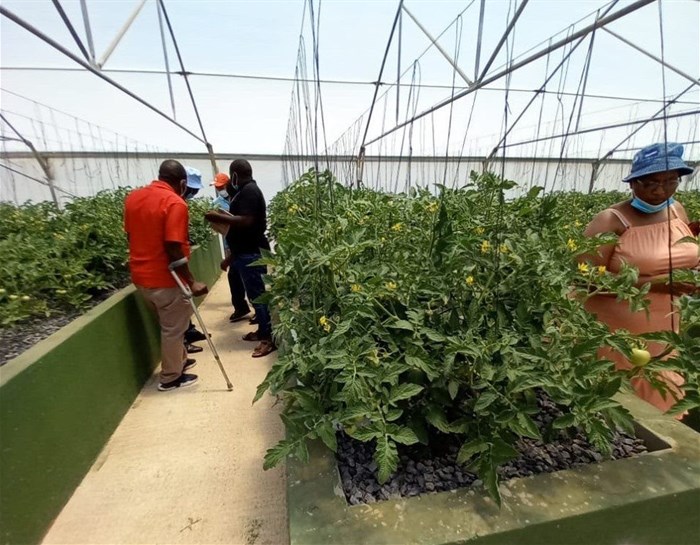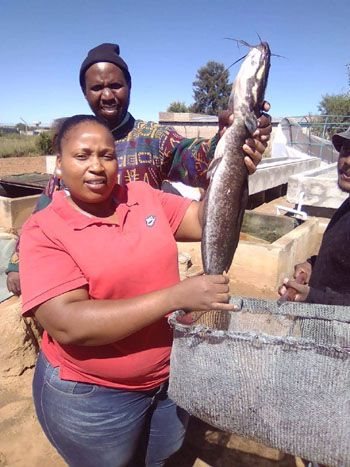
Top stories





Marketing & MediaWarner Bros. was “nice to have” but not at any price, says Netflix
Karabo Ledwaba 1 day

More news

Logistics & Transport
Maersk reroutes sailings around Africa amid Red Sea constraints

















One such example is that of InMed Aquaponics Social Enterprise, which has transformed the lives of nearly 100 disabled farmers in the Free State province.
Led by the knowledgeable and compassionate Mantombi Madona, an adaptive agriculture facilitator and trainer for Inmed South Africa, individuals who were once marginalised and stigmatised are running thriving agro-enterprises.
InMed’s Free State co-ops are showing the world the many advantages of aquaponics compared to traditional farming. "You can produce throughout the year, there is 90% less water consumption, less labour, it saves energy, and you can provide your own fertiliser from fish waste," says Madona. "You can also produce higher-quality produce at a faster rate than traditional farming."
Also critical to the success of these operations is the relationships Madona has built with the farmers and their communities. "More than practical training and skills, I have tried to show love, commitment and respect to all in the community," she says.
Although there are a high number of disabled people in the province – more than 230,000 people with disabilities live in the Free State – many of them still face the challenge of fighting the stigma in South Africa’s rural communities, where disabled farmers are not supported at fresh produce markets.
Over the past several years, InMed South Africa has provided practical and business training, links to markets and even access to affordable financing to help disabled farmers in the Free State achieve sustainable livelihoods and overcome stigma. The programme is an extension of the InMed Aquaponics Social Enterprise (INMED ASE) to transition historically marginalised individuals from subsistence to self-reliance.
With a hub facility in Vanderbijlpark, Gauteng, the Free State aquaponics farmers are becoming satellite facilities for training and food production. Their success has raised awareness about all ways people with disabilities can contribute to the community.

"The communities have become very supportive of these disabled farmers, volunteering to help out in some of their activities," notes Madona. "Many community members like to spend time with these special people because they learn from them and can see and appreciate the value they add to the community."
When InMed launched the Free State programme in partnership with Usaid, the subsistence farmers in the three project areas were struggling to produce enough vegetables even for their families. "Today, the three cooperatives that I work with are producing enough tomatoes and lettuce and a variety of vegetables, not only for themselves, but for their communities as well at an affordable price," says Madona. "They even turn a profit."
The cooperatives, made up mostly of disabled women and youth, are located in Hennenman (Phomolong Disabled Cooperative), Wesselsbron (Monyakeng Disabled People of South Africa), and Kroonstad (Lentsweleng Cooperative), the third-largest city in the Free State.
The water-conserving adaptive agricultural technologies and techniques introduced by InMed are a revolutionary approach to the interrelated issues of poverty, food security, nutrition and economic development in the Free State, one of the worst drought-stricken regions in South Africa—as well as the region with the largest number of people with disabilities in the nation.
"Aquaponics plays a vital role in these farmers’ food security, and they are now on their way to becoming self-sufficient, which has been especially important considering the last 18 months when everything had to shutdown at times," says Madona. "Fortunately, InMed was able to receive a special exception from the government for a few members to visit the projects to monitor the seedlings and InMed South Africa’s resource teams stayed available to offer telephonic guidance and support in the case of emergency.
Madona, who has a B.Tech in agricultural management from Central University of Technology in Bloemfontein, has led the Free State programme since 2018.
This month, thanks to Usaid, a group from these three cooperatives were given a two-day refresher training at the InMed Aquaponics Social Enterprise in Vanderbijlpark. Madona says the beneficiaries were so excited to attend this training which covered an aquaponics refresher and then further training on production planning, seedling management, identifying nutrient deficiencies as well as how to manage disease outbreaks.
"The training has opened our minds," says Mr Masibi from Hennenman. "We are so thankful to InMed South Africa and Usaid for this opportunity to achieve food security and generate an income as disabled people."
"Sustainability is what the project is all about enabling these co-op members to supply larger, more distant and commercial markets," notes Unathi Sihlahla, InMed South Africa programme director. "As these agro-enterprises grow, the cooperatives are creating jobs in the aquaponics operations and production, food processing, marketing and building, which in turn will contribute greatly to ongoing economic relief in this under-resourced province."